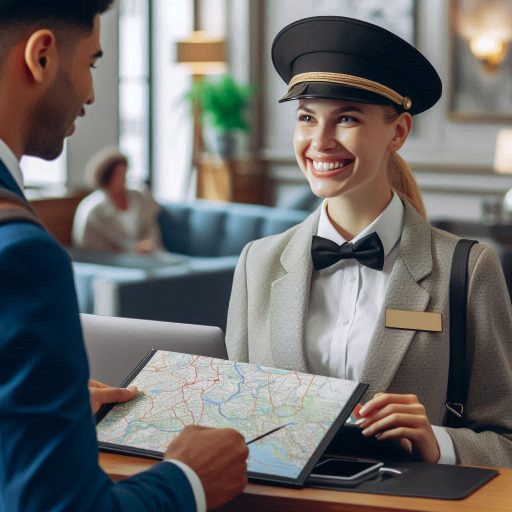Introduction
Effective communication is vital for concierge staff in any hospitality setting.
It plays a crucial role in delivering exceptional customer service.
Guests often turn to concierges for assistance, and how well staff communicate can make a significant difference in their experience.
Concierge staff are the face of the establishment.
They represent the brand and set the tone for guest interactions.
Clear and effective communication helps establish trust and rapport with guests.
When concierge staff convey information accurately and confidently, they instill a sense of assurance in the guests.
This connection enhances the overall guest experience and fosters customer loyalty.
Good communication skills also allow concierge staff to identify and meet guests’ needs more effectively.
When staff engage in active listening, they better understand guest requests and preferences.
This understanding leads to tailored recommendations that exceed expectations.
Guests appreciate personalized service, and effective communication is the key to achieving it.
Moreover, effective communication can prevent misunderstandings and conflicts.
When concierge staff express themselves clearly, they minimize the chances of errors.
This clarity helps avoid confusion over reservations, directions, and special requests.
Guests feel valued and respected when they receive accurate information and timely responses.
Understand the Importance of Non-Verbal Communication
Effective communication goes beyond words.
For concierge staff, non-verbal communication plays a crucial role in creating positive guest interactions.
Body language, facial expressions, and gestures convey messages that words sometimes cannot express.
By mastering these non-verbal cues, concierge staff can enhance their service and ensure guest satisfaction.
The Significance of Body Language, Facial Expressions, and Gestures in Communication
Body language significantly influences how guests perceive interactions.
For instance, open and relaxed posture indicates approachability.
A staff member standing with crossed arms may appear unwelcoming.
Furthermore, maintaining eye contact establishes trust and shows attentiveness.
When a concierge engages with a guest, sincere eye contact fosters a strong connection.
Facial expressions also communicate emotions and intentions.
A warm smile can create an inviting atmosphere.
In contrast, a frown can create discomfort.
Concierge staff should be mindful of their facial expressions, as they can affect a guest‘s mood.
For example, a staff member who greets a guest with a smile conveys enthusiasm and readiness to assist.
Gestures further enhance communication effectiveness.
Simple gestures, such as nodding, can signal agreement and understanding.
Using hand movements to emphasize points can make interactions more engaging.
However, overzealous gestures may distract or confuse guests.
Staff should find a balance that complements verbal communication without overwhelming guests.
Examples of How Non-Verbal Cues Can Impact Interactions with Guests
Non-verbal cues can greatly impact guest experiences.
For example, when a concierge assists a guest with luggage, their body language should convey eagerness to help.
Leaning slightly forward while offering assistance shows commitment to service.
This subtle cue assures the guest that their needs are a priority.
When a concierge maintains an open posture while speaking with guests, it fosters a welcoming environment.
On the other hand, avoiding eye contact can signal disinterest.
Staff should recognize that their non-verbal cues shape guests‘ perceptions and feelings.
Tips on How Concierge Staff Can Improve Their Non-Verbal Communication Skills
To improve non-verbal communication skills, concierge staff should practice self-awareness.
They should regularly check their body language in front of a mirror.
This practice can help identify unintentional negative cues.
Role-playing scenarios with colleagues can also boost confidence and refine skills.
Additionally, staff should seek feedback from peers.
Constructive criticism can highlight areas for improvement.
Engaging in training sessions focused on body language can further enhance skills.
Workshops can provide practical techniques for using non-verbal cues effectively.
Most importantly, understanding non-verbal communication is essential for concierge staff.
Body language, facial expressions, and gestures significantly impact guest interactions.
By becoming aware of these non-verbal cues, staff can create a more welcoming environment.
Improving non-verbal communication skills leads to better guest experiences and increased satisfaction.
Prioritizing these skills helps concierge staff deliver exceptional service that guests remember.
Read: Finding the Right Work-Life Balance as a Nail Tech
Active Listening Techniques
Active listening is a crucial skill for concierge staff.
It helps you understand guests’ needs and concerns more effectively.
When you listen actively, you create a welcoming atmosphere.
Guests feel valued and understood, which enhances their experience.
This practice builds trust and encourages open communication.
By employing active listening techniques, you can address concerns promptly and improve overall satisfaction.
The Benefits of Active Listening in Understanding Guest Needs and Concerns
Active listening significantly improves your understanding of guests‘ needs.
It allows you to catch subtle details that might otherwise be missed.
When you listen carefully, you can tailor your recommendations more precisely.
This personalized approach makes guests feel special and respected.
Additionally, active listening can help you identify potential issues before they escalate.
This proactive strategy ultimately leads to increased guest satisfaction and loyalty.
Strategies for Concierge Staff to Practice Active Listening, Such as Paraphrasing and Asking Clarifying Questions
One effective strategy is paraphrasing.
After a guest shares their needs, restate their message in your own words.
This shows you are paying attention.
For instance, if a guest requests dinner recommendations, you might say, ‘So, you‘re looking for a great Italian restaurant, right?‘
This technique confirms that you understand their request and allows for any necessary adjustments.
Asking clarifying questions is another important strategy.
If a guest’s request is unclear, seek more information.
Questions like ‘Can you tell me more about what you‘re looking for?‘ help you gather specific details.
This not only clarifies their needs but also demonstrates your commitment to providing excellent service.
It signals that you genuinely care about meeting their expectations.
The Importance of Giving Full Attention to Guests During Conversations
Giving your full attention during conversations is vital.
Avoid distractions, such as checking your phone or engaging with coworkers.
Instead, focus entirely on the guest in front of you.
Make eye contact and use appropriate body language to convey your engagement.
Nodding or leaning slightly forward can signal your interest.
This attentiveness fosters a positive connection and encourages guests to share more.
Create an environment conducive to active listening.
Find a quiet space when discussing sensitive topics or when guests express concerns.
This will help both you and the guest focus on the conversation.
By minimizing distractions, you can better understand their needs.
Incorporating these active listening techniques into your daily interactions will transform your approach to guest service.
Guests will appreciate your effort to understand their preferences and concerns.
Ultimately, this leads to increased satisfaction and loyalty.
When guests feel heard, they are more likely to return.
In summary, active listening is essential for concierge staff.
It enhances your ability to understand guest needs, build rapport, and provide tailored recommendations.
By practicing techniques like paraphrasing and asking clarifying questions, you will significantly improve guest interactions.
Prioritizing full attention during conversations will help create memorable experiences, making guests feel valued and appreciated.
Read: Steps to Become a Professional Pet Groomer in the USA
Use Clear and Concise Language
Effective communication forms the backbone of exceptional concierge service.
Using clear and concise language is vital for helping guests understand information quickly.
When you simplify your language, you eliminate confusion and enhance guest satisfaction.
The Importance of Using Simple and Easy-to-Understand Language When Communicating with Guests
Guests often come from diverse backgrounds.
They may speak different languages or have varying levels of comprehension.
Therefore, using complex terminology or jargon can create barriers.
For example, if a concierge says, ‘The establishment provides a plethora of gastronomic options,‘ a guest might feel confused.
Instead, you could say, ‘We have many dining options.
‘ This simple change makes the message accessible to everyone.
Examples of How Complex Language Can Lead to Misunderstandings or Confusion
Misunderstandings can also arise from vague language.
If a concierge tells a guest, ‘The service should be available soon,‘ the guest might wonder when.
A clearer statement would be, ‘The service will arrive in ten minutes.
‘ This way, guests have a precise expectation, reducing anxiety and frustration.
Tips on How Concierge Staff Can Communicate Clearly and Effectively
To ensure clarity in your communication, consider these tips:
- Use Short Sentences: Aim for straightforward statements.
Keep sentences to a maximum of 20 words.
This rule helps convey your message effectively without overwhelming the guest. - Avoid Jargon: Skip industry terms that might confuse guests.
Instead, use common language that everyone can understand.
For instance, instead of saying ‘Check-in process,‘ use ‘How to get your room.‘ - Be Direct: When giving directions or information, be specific.
If a guest asks for the gym location, avoid ambiguous phrases like ‘Go past the elevators.‘
Instead, say, ‘Turn left after the elevators, and it‘s on your right.‘ - Encourage Questions: Invite guests to ask for clarification.
This openness fosters trust and makes guests feel comfortable.
If a guest seems puzzled, simply ask, ‘Is there anything I can clarify for you?‘ - Use Visual Aids: Sometimes, a picture is worth a thousand words.
When appropriate, provide maps or brochures to supplement verbal communication.
Visual aids help guests navigate your establishment more easily. - Practice Active Listening: Pay close attention to what guests say.
This practice allows you to respond appropriately and address their specific needs.
If a guest mentions a concern, repeat it back to ensure you understand.
By adopting these strategies, concierge staff can communicate effectively.
Clear and concise language not only enhances the guest experience but also builds lasting relationships.
Remember, the goal is to make guests feel valued and understood.
Every interaction offers an opportunity to create memorable moments through effective communication.
Read: Essential Skills Every Pet Groomer Should Have
Practice empathy and understanding
Empathy plays a crucial role in effective communication for concierge staff.
By genuinely understanding guests’ feelings, staff can build strong rapport and trust.
When guests feel valued, they are more likely to return and recommend the service to others.
Here are some strategies for concierge staff to practice empathy and enhance the guest experience.
The Value of Empathy in Building Rapport with Guests and Addressing Their Needs
Empathy creates a welcoming atmosphere that encourages open communication.
When concierge staff demonstrate empathy, they foster trust and connection with guests.
This rapport makes guests feel understood and appreciated.
As a result, they are more likely to share their needs and preferences.
Addressing these needs promptly leads to improved guest satisfaction.
Guidance on How Concierge Staff Can Show Empathy Through Active Listening and Acknowledging Guests’ Emotions
First, active listening is essential.
This means giving guests your full attention and truly hearing what they say.
When a guest shares their needs or concerns, focus on their words and emotions.
Nod occasionally and maintain eye contact to show engagement.
This simple act conveys that you care about their experience.
Next, acknowledge guests’ emotions openly.
When a guest expresses frustration or disappointment, validate their feelings.
Use phrases like, “I understand how that could be upsetting,” to demonstrate your understanding.
This approach helps guests feel heard and respected.
Empathy fosters a sense of connection, making guests more comfortable discussing their needs.
Another effective technique is to ask open-ended questions.
These questions encourage guests to elaborate on their feelings and desires.
For example, you might ask, “What can I do to make your stay more enjoyable?” This approach invites guests to share their expectations and concerns.
It also shows that you value their input and want to enhance their experience.
Additionally, practice patience during interactions.
Some guests may take time to articulate their thoughts or emotions.
Allow them to express themselves without interruption.
Demonstrating patience shows that you value their perspective, creating a more welcoming environment.
Transform Your Career Today
Unlock a personalized career strategy that drives real results. Get tailored advice and a roadmap designed just for you.
Start NowExamples of How Empathetic Communication Can Enhance the Guest Experience
Empathetic communication can greatly enhance the guest experience.
For instance, imagine a guest who feels anxious about navigating a new city.
Instead of simply providing directions, you could take time to explain key landmarks.
Offer tips on local customs, and even suggest activities that align with their interests.
This thoughtful approach leaves a lasting impression and helps guests feel more at ease.
Another example is when a guest expresses disappointment about a service.
Instead of brushing it off, acknowledge their feelings.
You might say, “I‘m sorry to hear that your dinner reservation was not satisfactory.
Let me help you find a better option.
” This response not only addresses the issue but also shows that you care about their satisfaction.
In fact, practicing empathy and understanding in communication is vital for concierge staff.
By actively listening, acknowledging emotions, asking open-ended questions, and being patient, staff can create a positive atmosphere.
Ultimately, empathetic communication not only builds rapport with guests but also elevates their overall experience, fostering loyalty and satisfaction.
Read: How to Handle Emergency Situations in Pet Grooming

Adapt Communication Style to Different Guests
Concierge staff play a crucial role in enhancing the guest experience.
Effective communication is essential for building rapport and meeting individual needs.
Adapting communication styles based on guest preferences can lead to memorable interactions and exceptional service.
Importance of Adjusting Communication Style
Every guest is unique, with different backgrounds, expectations, and preferences.
Recognizing these differences allows concierge staff to tailor their approach.
For example, a business traveler may appreciate a more formal tone, while a family on vacation may respond better to a casual, friendly demeanor.
Understanding these nuances is key to providing excellent service.
Tips for Tailoring Communication Approaches
One effective way to adapt communication style is by actively listening to guests.
Pay attention to their language, tone, and body language.
This will help you gauge their comfort level and adjust your approach accordingly.
If a guest seems relaxed and informal, reciprocate with a casual tone.
Conversely, if a guest appears more reserved or formal, match their style to create a sense of familiarity.
Another strategy is to ask open-ended questions.
This encourages guests to share their preferences and needs.
For instance, ask, ‘How can I assist you today?‘ rather than offering limited options.
This approach allows guests to express their desires more freely, leading to personalized recommendations.
Using appropriate titles and forms of address also demonstrates respect for guests‘ preferences.
Some guests may prefer to be called by their first names, while others appreciate a more formal title.
When in doubt, err on the side of formality until the guest indicates otherwise.
This small gesture shows attention to detail and enhances the overall experience.
Benefits of Personalized Communication
Personalized communication fosters positive interactions.
When guests feel heard and understood, they are more likely to engage with staff.
This rapport builds trust and encourages guests to share feedback, enhancing service quality.
Satisfied guests often become repeat visitors, leading to increased loyalty and positive reviews.
Furthermore, adapting communication styles can help resolve issues more effectively.
Guests facing challenges may feel frustrated or anxious.
By responding with empathy and adjusting your tone, you can help alleviate their concerns.
A calm, understanding demeanor can turn a negative situation into a positive outcome.
In essence, adapting communication styles to fit individual guest needs is essential for concierge staff.
By actively listening, asking open-ended questions, and using appropriate forms of address, staff can create personalized interactions.
The benefits of tailored communication extend beyond immediate satisfaction.
They foster lasting relationships that enhance the overall guest experience.
Handle Difficult Situations with Professionalism
Concierge staff often encounter challenging guests and situations.
Maintaining composure is crucial in these moments.
Professionalism reflects your commitment to excellent service.
Here are effective strategies to handle difficult situations while remaining calm and courteous.
How Concierge Staff Can Maintain Composure and Professionalism When Dealing with Challenging Guests or Situations
First, stay composed.
Take a deep breath before responding to a challenging guest.
This helps you control your emotions.
A calm demeanor sets the tone for the interaction.
It shows the guest that you are confident and in control.
Next, listen actively.
Allow the guest to express their concerns fully.
Show empathy and understanding by nodding and making eye contact.
Avoid interrupting them, as this can escalate tensions.
Listening builds rapport and lets the guest feel heard.
Acknowledge their feelings, even if you disagree with their perspective.
This helps in diffusing the situation.
Strategies for De-Escalating Conflicts and Resolving Issues Through Effective Communication
Use clear and positive language when responding.
Instead of saying, ‘I can‘t do that,‘ say, ‘Let‘s explore some alternatives.
‘ This shift in language promotes a collaborative atmosphere.
Offer potential solutions to the issue at hand.
Focus on what you can do rather than what you can‘t.
This proactive approach fosters trust and reassures the guest.
Additionally, maintain a polite tone, even when faced with hostility.
Using courteous language can help calm an irate guest.
Phrases like ‘I understand your frustration‘ or ‘I appreciate your patience‘ can work wonders.
Your tone can significantly influence the interaction’s outcome.
If emotions run high, suggest a brief break.
Encourage the guest to step aside for a moment.
This allows both parties to cool down and gather their thoughts.
After a few minutes, reconvene and address the issue calmly.
This strategy can often transform a heated exchange into a constructive conversation.
Tips on How to Remain Calm and Courteous in High-Pressure Situations
Moreover, set boundaries respectfully.
If a guest becomes overly aggressive or rude, it‘s essential to assert yourself.
Politely state that you are there to assist, but you cannot tolerate disrespect.
Setting clear boundaries maintains professionalism and demonstrates self-respect.
Finally, when the situation resolves, follow up.
Ensure that the guest is satisfied with the resolution.
A simple ‘Thank you for your understanding‘ can go a long way.
This shows that you value their experience and care about their satisfaction.
Generally, handling difficult situations with professionalism is vital for concierge staff.
Staying calm, listening actively, using positive language, and setting boundaries are essential strategies.
By following these tips, you will enhance your communication skills and provide exceptional service, even in challenging circumstances.
Gain More Insights: Health Risks Associated with Pest Control Work
Seek Feedback and Continuously Improve Communication Skills
Effective communication is essential for concierge staff in providing exceptional guest experiences.
One of the best ways to enhance communication skills is by seeking feedback from guests and colleagues.
Encouraging this practice fosters a culture of continuous improvement.
Encourage Concierge Staff to Ask for Feedback from Guests and Colleagues on Their Communication Skills
Concierge staff should actively ask guests for their opinions after interactions.
Simple questions like, ‘How did I do?‘ can yield valuable insights.
Guests appreciate when staff seek their input, which builds trust and rapport.
Their feedback often highlights areas for improvement and reinforces positive communication behaviors.
Similarly, seeking feedback from colleagues is crucial.
Team members can offer perspectives that guests might not provide.
Constructive criticism from peers can identify communication styles that may not resonate well.
By discussing these insights, staff can adapt their approaches and become more effective communicators.
The Benefits of Seeking Constructive Criticism and Using It to Enhance Communication Abilities
The benefits of seeking constructive criticism are profound.
It promotes a growth mindset, encouraging concierge staff to view challenges as opportunities.
When staff embrace feedback, they learn to adapt their communication styles to suit different situations and guests.
This adaptability is key in a dynamic hospitality environment.
How Concierge Staff Can Continue to Develop Their Communication Skills Over Time
To continue developing communication skills, concierge staff can pursue several strategies.
First, they should regularly reflect on their interactions.
Keeping a journal of daily experiences can help identify patterns and areas for improvement.
Staff can ask themselves questions like, ‘What worked well today?‘ and ‘What could I have done differently?‘
Second, concierge staff can participate in training sessions and workshops.
These educational opportunities often focus on effective communication techniques.
Role-playing scenarios can help staff practice responses to various guest inquiries.
Additionally, online courses offer flexibility and accessibility for continuous learning.
Third, staff should observe and learn from skilled communicators within their organization.
Watching how experienced colleagues interact with guests can provide practical insights.
They can note effective phrases, body language, and tone of voice that enhance communication.
Finally, creating a feedback loop is essential.
After implementing feedback, staff should follow up with guests and colleagues.
Asking if the changes made a positive impact reinforces the value of seeking input.
This loop ensures ongoing dialogue about communication and helps build strong relationships.
Essentially, seeking feedback and committing to continuous improvement are vital for concierge staff.
By actively requesting input, participating in training, and reflecting on their experiences, staff can refine their communication skills.
This commitment not only enhances their abilities but also elevates the overall guest experience.
Conclusion
Effective communication is crucial for concierge staff.
Throughout this blog, we explored key tips to enhance communication skills.
First, active listening ensures you understand guests‘ needs clearly.
Use open body language to convey attentiveness and warmth.
Speak clearly and concisely to avoid confusion.
Tailor your communication style to match the guest‘s preferences.
Always be positive and enthusiastic to create a welcoming atmosphere.
In addition, ask open-ended questions to encourage guests to share more.
This builds rapport and helps you provide personalized service.
Empathy plays a vital role; understand and validate guests‘ feelings and concerns.
Lastly, follow up with guests to ensure their needs were met and to demonstrate your commitment to their satisfaction.
These communication strategies are essential in delivering exceptional customer service.
As a concierge, your ability to communicate effectively can make a significant difference in guests‘ experiences.
Positive interactions foster loyalty and enhance the reputation of your establishment.
Guests appreciate staff who are attentive and responsive, leading to repeat visits.
Encourage yourself and your colleagues to practice these skills regularly.
Role-playing scenarios can help reinforce effective communication techniques.
Regular training sessions can further improve your team‘s communication abilities.
Keep a journal to reflect on daily interactions and identify areas for improvement.




